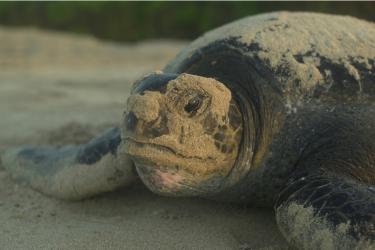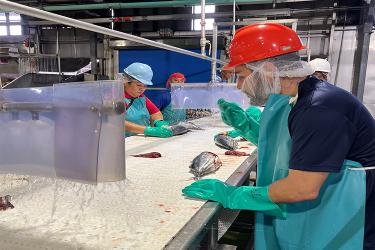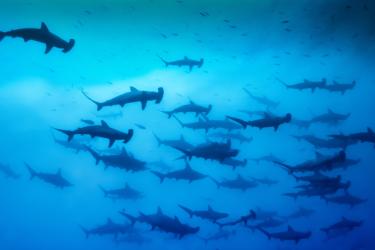The United States continued to advance its objectives to improve international fisheries management through a successful 8th meeting of the North Pacific Fisheries Commission. The meeting concluded April 18, 2024, in Osaka, Japan. U.S. proposals and influence over other adopted measures, and cooperation among members, led to progress on:
- Addressing labor abuses in the fishing industry
- Combating illegal, unreported, and unregulated fishing
- Rebuilding overfished stocks and strengthening fisheries controls
- Enhancing compliance processes and transparency
The North Pacific Fisheries Commission is a regional fisheries management organization (RFMO) composed of nine member governments and authorities. They are responsible for managing certain fisheries resources—including pelagic species, squid, and deep-sea stocks—and related ecosystems on the high seas of the North Pacific. NPFC meets annually to obtain scientific advice, negotiate binding measures that members implement to manage and monitor fishing vessels operating in the area, and hold each other accountable for implementing such measures through compliance processes.
“NPFC has made huge strides the last couple years in terms of the development of its conservation and management measures, scientific advice, compliance framework, and transparency of decision-making,” said Michael Brakke, U.S. Commissioner to the NPFC. “Multilateral cooperation is not easy and takes time, but is one of the best tools we have to address stakeholder concerns about sustainability and illegal fishing because these binding decisions influence how a wide range of countries manage fisheries and how vessels operate on the high seas.”
Notable Steps Forward on Labor, Climate
NPFC adopted a U.S.-led resolution to highlight the importance of addressing labor abuses in fisheries and improving labor standards. This action is consistent with U.S. leadership on this issue across a range of RFMOs. Another U.S.-sponsored resolution adopted at NPFC in 2023 focused on climate change. NPFC has already taken steps to more proactively incorporate climate change scenarios into its scientific advice and to consider climate impacts in its decision making.
Improved Management of Bottom Fisheries
The United States and Canada introduced a proposal to improve the management of bottom fisheries in the Northwestern Pacific Ocean. The Commission adopted a revised version of the proposal that:
- Clarified the obligations in the measure and overall bottom fishing management framework
- Established more clearly binding limits on North Pacific armorhead (an overfished stock also found in the U.S. Exclusive Economic Zone)
- Extended the closure on bottom fishing from 1-month closure
The United States looks forward to working with other members on other aspects of the original proposal in future meetings. They include considering precautionary area closures to bottom trawling to prevent potential significant adverse impacts on deep-sea vulnerable marine ecosystems along the Emperor Seamount chain.
Improved Management of Priority Species on the High Seas
NPFC also took steps to improve the management of priority species such as Pacific saury and chub mackerel. Both are important food sources harvested on the high seas and in waters under the jurisdiction of coastal states such as Japan. Members adopted an interim harvest control rule that applied a 10 percent reduction in total allowable catch beginning in 2024. The rule meets the basic management objective to rebuild the Pacific saury stock to sustainable levels within 5 years. The United States looks forward to NPFC’s future work to adopt a full management procedure and be as responsive as necessary to changes in the short-lived stock’s status. A revised measure to manage chub mackerel will also include slight reductions in allowable catch on the high seas and improve monitoring and controls on the fishery.
Conservation Efforts for Salmon
NPFC adopted a measure, led by Canada and co-sponsored by the United States and Korea, to prohibit directed fishing and retention of salmon on the high seas. It also requires reporting of incidental catch. This decision is compatible with other international agreements to conserve salmon. It also follows a similar measure adopted last year to improve conservation of sharks. That decision ensured that fishing vessels operating under NPFC are not targeting unregulated shark species or undermining other agreements that manage highly migratory species.
Improving Compliance to Address Illegal, Unreported, and Unregulated Fishing
RFMOs are important multilateral venues to advance U.S. interests to counter illegal, unreported, and unregulated (IUU) fishing. NPFC adopted a revised compliance monitoring scheme to significantly advance the organization’s ability to assess compliance. This will ensure that members implement binding management measures, foreign-flagged vessels follow the rules, and that flag states hold them accountable when they do not.
The United States also advanced a measure to update the IUU vessel listing process. It will help ensure the list of vessels identified as engaged in IUU fishing is as useful as possible for surveillance and enforcement purposes.
The United States does not have fishing vessels targeting NPFC fisheries in the Convention Area but plays an important role in regional compliance and enforcement operations. The U.S. Coast Guard maintains an active inspection presence. It conducts aerial surveillance and high seas boardings and inspections of foreign-flagged fishing vessels to ensure they are complying with measures and help combat IUU fishing.
The United States has also prioritized increasing the transparency of NPFC operations. After decisions made over the last 2 years, NPFC has significantly improved the level of observer participation in its meetings and public access to its documents.
NOAA Fisheries appreciates the improvements in cooperation among members and governance of NPFC in recent years. There is much more work to be done and some of the progress is gradual, but NPFC’s recent accomplishments help advance U.S. interests in ensuring sustainable fisheries management and creating stronger commitments among countries to combat illegal fishing and forced labor.



